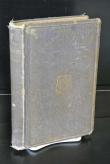Nineteenth-Century Travel Writing
John Mitchel (1815-1875) was an author, editor, solicitor, activist and Irish nationalist. In the 1840s, Mitchel began editing Irish nationalist papers, firstly the as assistant editor of Nation under Charles Duffy, and then launching United Irishman himself, which broadcasted views of the Young Ireland Movement. Mitchel was charged with sedition under the Treason Felony Act (1848) and sentenced to 14 years’ transportation, and was sent to Van Diemen’s Land (although originally he was in Bermuda and Cape of Good Hope).Two years after he was granted a ticket of leave, Mitchel escaped to America, where he was welcomed a hero on his arrival in New York. Jail Journal narrates his experience of five years in various British prisons, and was originally published in the New York newspaper The Citizen from January 12 to August 19 1854. Mitchell began his book with a treatise on the dominating force of England on Irish history. After varied experiences of prison life, Mitchell tells of his arrival as a convict in Van Diemen's Land, describing the landscape, flora and fauna, the convict system, colonial society, and his experiences there are detailed in a conversational and engaging manner.
 4666454383629360897.jpg
4666454383629360897.jpg
 Jail Journal; or, Five Years in British Prisons. Commenced on Board the Shearwater Steamer, in Dublin Bay, Continued at Spike Island—On Board the Scourge War Steamer—On Board the 'Dromedary' Hulk, Bermuda—On Board the Neptune Convict Ship—At Pernambuco—At the Cape of Good Hope (during the Anti-Convict Rebellion)—At Van Diemen’s Land—At Sydney—At Tahiti—At San Francisco—At Greytown—And Concluded at No. 3 Pier, North River, New York.
single work
travel
Jail Journal; or, Five Years in British Prisons. Commenced on Board the Shearwater Steamer, in Dublin Bay, Continued at Spike Island—On Board the Scourge War Steamer—On Board the 'Dromedary' Hulk, Bermuda—On Board the Neptune Convict Ship—At Pernambuco—At the Cape of Good Hope (during the Anti-Convict Rebellion)—At Van Diemen’s Land—At Sydney—At Tahiti—At San Francisco—At Greytown—And Concluded at No. 3 Pier, North River, New York.
single work
travel


